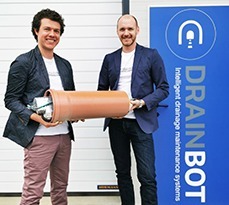Cambridge MBA alumnus, Forbes 30 under 30 and MBA scholarship recipient Slaven Stekovic (MBA 2018) puts a career in life science on hold and takes us through the management of interrupted supply chains and the disruption of mobility infrastructure in his newest startup.
What is your current venture?
DrainBot is a new robotics company that specialises in the development and distribution of automated, robotic systems for tunnel drainage maintenance. We aim to make the maintenance of tunnel drainage more efficient, by reducing the costs as well as the resource consumption of regular maintenance to the operator.
What is the company story and what led you to develop the concept?
The company and its innovation are the joint effort of myself and my co-founder Philipp Lepold. Philipp has almost a decade of relevant industry experience in product development and sales, while I came in with an experience of successfully building and running technology-based startups, both before and after my Cambridge MBA.
This was not my first venture and with Philipp’s existing strong network within the industry, the process of development was much easier to direct from the outset.
Within a short time, we were already having conversations with potential customers and developing relationships with suppliers, leading to further use of our technology.
How did you find your co-founder and what skill set were you looking for across the company?
Philipp and I have been friends for some years now. After making sure that our working methods, as well as our ambitions, were aligned, we decided to work on this business together.

Working remotely due to the geographical distance between us was the norm from the start as I was based initially in the UK. This resulted in building a very efficient and transparent series of processes, as well as communications channels. This is still very much the basis of our operation now that we are both located in Austria. Starting a company together it is important to identify your specific skills and ensure you work to your strengths. I am currently the business end of the startup and Philipp is the technology side. Naturally, we are also able to work across multiple aspects of the business as well. We adapt our roles to the current circumstance, as any founder at an early stage should do.
What elements make this attractive to investors?
This sector historically has not seen the same level of automation and digitisation that perhaps other sectors have experienced. Tunnels exist as a hugely valuable part of the global infrastructure for rail, road, or urban underground transportation operators. However, due to the challenge of multiple technical aspects of maintenance of these pieces of infrastructure, they often operate below their maximum efficiency.
Overall, our intention is to disrupt and wake up a market that has been hesitant to embrace technology and new methodologies. As world populations grow and mobility increases this trend is predicted to grow. Combining automation and digitisation is the key to reducing costs and developing new initiatives across infrastructure development and construction. This is where the hidden potential across this sector lies.
What MBA skills have you applied to the startup and scale of the venture?
My background as a PhD in molecular biology before my MBA, means my skill base applied across DrainBot is business based rather than purely industry specific knowledge. Within my previous ventures I was the main scientific driver in the startup, now my finance, marketing and business development skills are being applied. Understanding the market dynamics, financial modelling skills and the operations management principles I learnt during my Cambridge MBA have been key as we grow and scale DrainBot. Combined with the Cambridge Judge Business School alumni network globally, we can draw knowledge from other industries or sectors and apply this to our sector.
What MBA skills do you see applying in the future?
As we continue to expand internationally our need for knowledge on how different countries apply different processes and techniques to this sector is more important. Operation optimisation will need to be applied differently across different regions and continents. Knowledge and better understanding of this differentiation is key. The Cambridge MBA with its diverse class of over 50 nationalities, together with the huge variety of sectors and backgrounds across my cohort, allows me to view and review projects from a collaborative viewpoint and different global perspectives. Along with my entrepreneurial experience, the company keeps an eye on both the micro and macro-economic ecosystem. Global markets as well as government initiatives can alter the course of our niche market very quickly. We learnt early on to embrace change, as it represents new opportunities in business.
Share a little about your career journey post-MBA?
Immediately after completing my Cambridge MBA I was invited to join the team at established Cambridge based biotech – Repositive – as their Head of Strategic Growth. Working alongside their CEO and Founder Fiona Nielsen and the team was a really rewarding experience.
Supporting Repositive as it expanded further into medical research and drug development provided a platform to further embed and develop my MBA skills. Exiting my first venture and now focusing solely on developing DrainBot, allows me to relocate back to Austria, a country rich in tunnels!
What leadership skills are you applying to your company growth?
We are ensuring communication and project leadership can be applied across an entire organisation to ensure a smooth running of operations, especially during the current crisis with COVID-19. Complete transparency combined with open communication have allowed the smooth execution and continuation of projects with partners spread across several European countries. We continue to foster strong communication on several levels between partners and beyond the level of CEO and Senior management. Our role goes beyond delivery of IP and access to market, we are involved in collaborative projects with European companies where our leadership and management skills are being applied.
Recently, our efforts have been noticed by several governmental agencies in Austria and the European Commission, who are supporting our efforts through financial and advisory means. In such a multi-stakeholder environment, communication is key to successful collaboration and open innovation culture.


